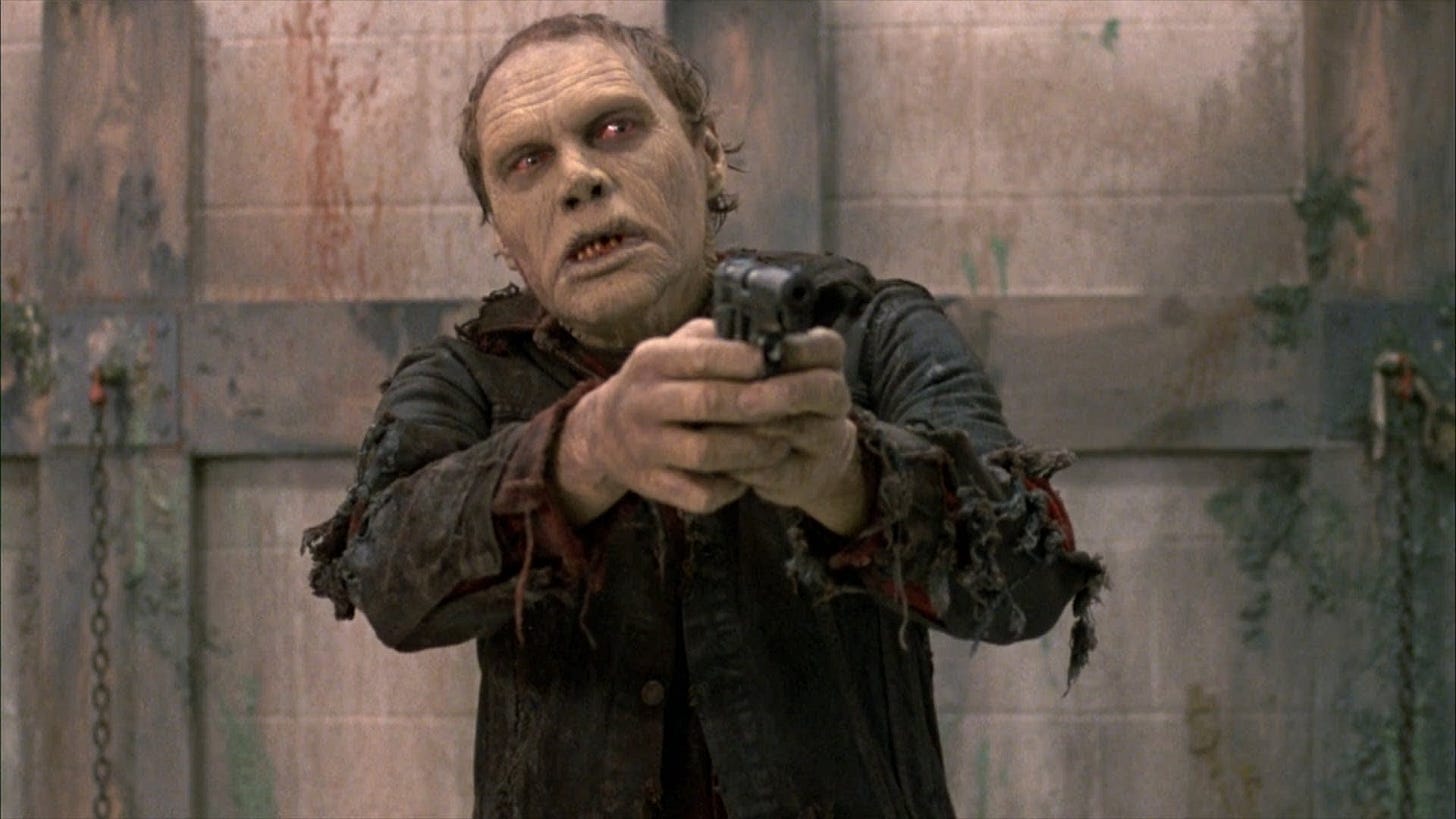It’s Still the Day of the Dead
Romero’s third zombie film isn’t his best. But it has a bite.
Day of the Dead (1985) is perhaps the most forgettable of Romero’s zombie films—or at least, I appear to have forgotten it almost completely. I think I must have seen it years ago, but I remembered virtually nothing about it. Its memory had been bloodily devoured by all the other toothy zombie films I’d seen—ingested into genre.
That doesn’t mean it’s a bad film. On the contrary, it’s a good film—just one that’s considerably less distinctive than Romero’s groundbreaking Night of the Living Dead, or than his satirical, subversive flesh orgy of consumerism, Dawn of the Dead. Day feels like a movie that knows the conventions and is pulling them on like a flesh suit, rather than tearing them apart to see how they work. Even the gore set pieces, with screaming victims pulled grotesquely apart by the zombie hordes, is more a call back than a shocker. This is the buffet you expect of a zombie film, and this is the buffet on offer.
And again, it’s a pretty good buffet. Romero has already laid out his central thesis in his earlier films—human beings are sometimes charming and sympathetic, but at the end of the day, if left to our own devices, we will eat each other in an arterial spray of viciousness, bigotry, hate and mindless desire.
The twist in Day is that the human zombies at the ends of each other’s teeth aren’t everyday unprepared civilians. They’re military and they’re scientists; the people who are supposed to protect us with knowledge and firearms. The researchers have retreated into a bunker to try to develop a cure for the zombie plague; soldiers have gone with them to protect them. They take research subjects—ie zombies—from the many corpses lurching outside the fence that bounds the facility.
As you’d expect in a Romero movie, the humans in control are anything but. The commanding officer of the base dies just before the beginning of the film, and his replacement, Captain Henry Rhodes (Joseph Pilato) is drunk on power and fear. The lead doctor, “Frankenstein” Logan (Richard Liberty), isn’t really interested in a cure, and has instead become obsessed with teaching the zombies to be more civilized and human. To try to train his star zombie pupil, “Bub” (Sherman Howard), he rewards him with fresh human body parts to eat. This does not go over well with Rhodes.
Romero’s sensibilities as a director are often a bit stagey and even campy. Frankenstein wanders around covered with blood, even when he sits down to a meal. Rhodes spends the entire film with his jaw locked and his eyes about ready to bug out of his head. His soldiers/henchmen break into hyena laughs when he crudely insults Sarah Bowman (Lori Cardille), the movie’s scientist protagonist and the one woman in the cast.
The fact that the performances feel fake is arguably the point though; the humans aren’t in general any more convincingly natural or human, than the zombies. They jerk and snap and threaten much like Bub—who it turns out was once in the military. The zombie fires off salutes in a parody of military discipline not far removed from the parody of military discipline performed by the increasingly frothing military men. By the end, Bub’s even a better shot with a pistol than the humans.
Discussions of the film often point out that the humans are devolving, turned into rabid animals by fear and the withdrawal of the authority which kept social norms in place. This isn’t wrong—but at the same time, Romero is attuned to the ways in which human evil is distinctly human. Bub is a more effective killer with a gun than he was before he was trained. And Sarah’s lover, Miguel (Anthony Dileo Jr) is poisoned by a very human toxic masculinity. Sarah handles the zombie infestation better than him, and he can forgive neither her nor himself.
At the end of the film, with his arm cut off in a symbolic castration, Miguel lets the zombies through the fence. He allows them to eat him alive, making himself zombie, because being human is too painful. Zombies may use humans for food, but it takes a human to use zombies as an instrument of self-flagellation and murder.
Zombies can turn us into them because we’re already them, or worse. That’s an insight that’s sunk it’s teeth into the proliferating zombie movies from 28 Days Later to The Sadness. Perhaps the familiarity is why Day of the Dead doesn’t have the same indelible power as its two predecessors. Still, as MAGA gasps and drools and giggles at the thought of clamping us in its rotting orange teeth, the movie feels worth revisiting. Sometimes you don’t remember things because they’re irrelevant. And sometimes you don’t remember them because they happen every day.


